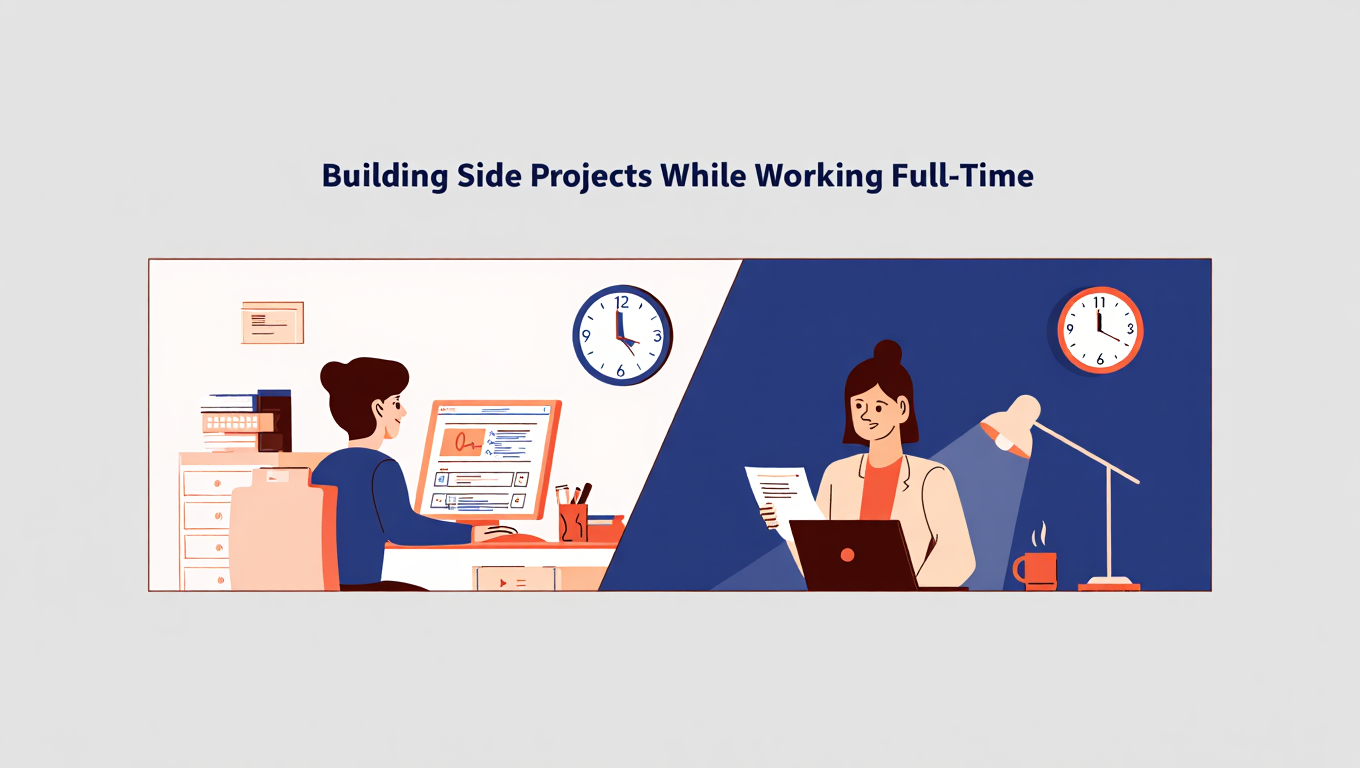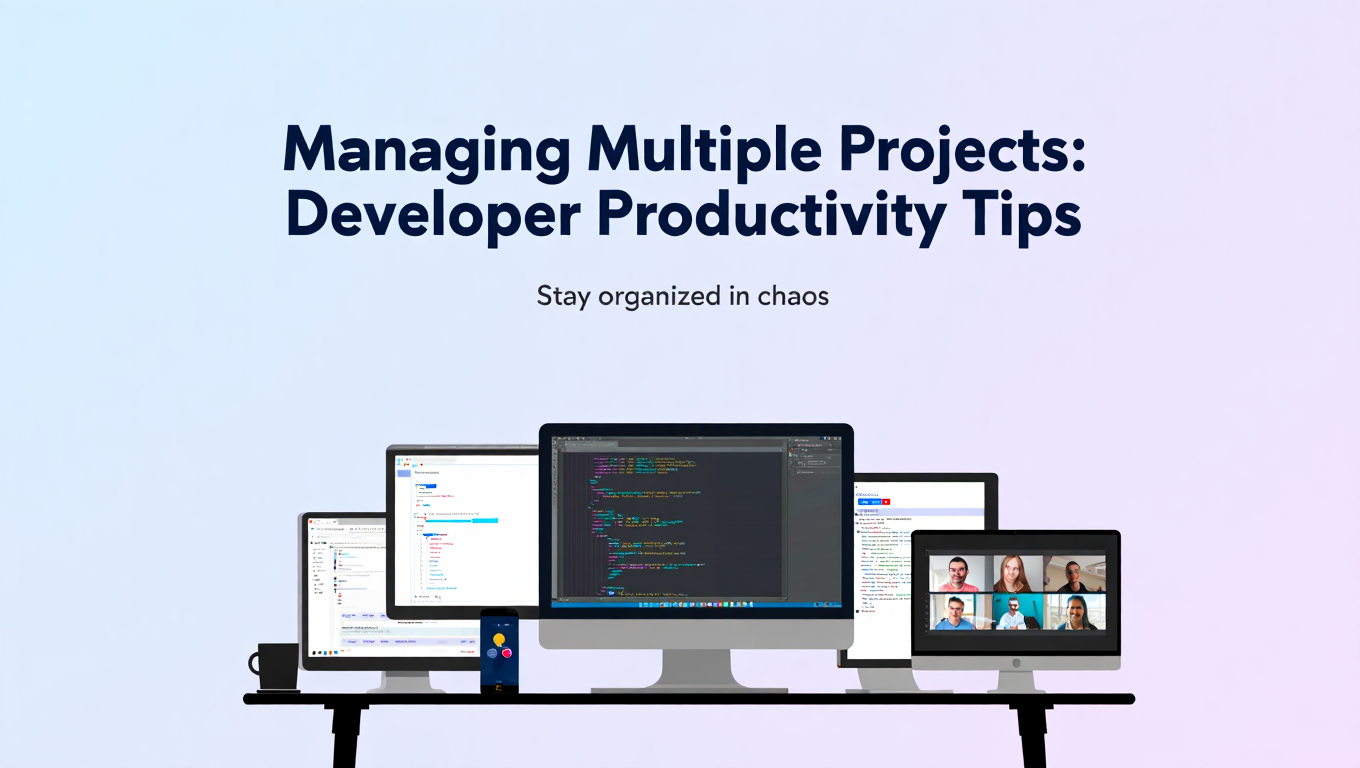Why Solo Devs Should Share Progress with People They Trust
I kept my project secret for 6 months. Then I showed it to 3 people. One conversation changed everything. Here's why sharing matters.

I spent six months building a project in complete isolation.
Nobody knew what I was working on. I told myself I'd share it when it was "ready" when the code was clean, the features were polished, and everything worked perfectly.
Then I showed it to three people.
One conversation changed the entire direction of the product.
A friend someone with zero technical background looked at my carefully designed interface and said, "I have no idea what this does." I'd spent weeks perfecting features that solved a problem only I understood. I was so deep in the code that I couldn't see what was obvious to everyone else.
I'd built the wrong thing.
That's when I learned the hard way.. sharing progress isn't about showing off. It's about catching your blind spots before they cost you months of work.
Why Building in Isolation Feels Safe (But Isn't)
When you're building alone, it's tempting to keep everything private.
No judgment. No unwanted opinions. No one telling you your idea won't work.
I get it.
But here's what actually happens when you work in a vacuum.. you stop seeing your project objectively. The features you built three months ago seem essential because you built them. The onboarding flow makes perfect sense because you designed it. The value proposition is clear because you understand the problem you're solving.
Then a real person tries to use it and you realize.. nothing makes sense.
I've watched myself make this mistake repeatedly. I build for weeks, convinced I'm on the right track, only to discover I've been solving a problem that doesn't exist or building a solution nobody wants.
Sharing progress early catches these problems when they're still easy to fix.
What Fresh Perspective Actually Gives You
The best feedback I've gotten has come from people who aren't developers.
Not because technical feedback isn't valuable. It is.
But non-technical people see your product the way your users will.. without any context, without understanding your architecture, without caring about your tech stack.
They just want it to work.
I showed an early prototype of a deployment automation tool to a friend who runs a small e-commerce business. She's not technical. I walked her through what it did. Five minutes in, she stopped me and asked, "Why would I use this instead of just clicking deploy in Heroku?"
I didn't have a good answer.
I'd spent three weeks building a solution to a problem that already had a simpler fix. She identified my biggest blind spot in one question. A developer would have asked about my choice of container orchestration or my CI/CD pipeline design. She asked the only question that actually mattered.. why does this exist?
That's the insight you miss when you only talk to people who think like you.
Who You Should Actually Share With
Not everyone.
Some feedback will derail you. Some will save you months of wasted work.
The difference is knowing who to listen to.
I share progress with three types of people..
People who understand my goals. They know what I'm trying to build and why. They've heard me talk about the problem before. They won't suggest I pivot into a completely different market or question my entire approach. They help me refine what I'm already doing.
People who represent my target users. If I'm building a tool for solo developers, I talk to other indie hackers. If I'm building a SaaS for small businesses, I talk to someone who runs one. They don't need to be technical. They just need to have the problem I'm trying to solve.
People who will tell me the truth. Not everyone will. Some people default to encouragement even when your idea is terrible. The best feedback comes from people who care enough to be honest even when it stings.
I don't share with..
Overly critical people who find problems in everything. Dream crushers who think every idea is doomed to fail. People who want me to build their vision instead of mine.
You want feedback, not permission.
What to Share (and What to Keep to Yourself)
You don't need to share everything.
Building in public has become trendy. Developers posting daily progress updates, sharing revenue numbers, documenting every decision. That works for some people. It doesn't work for me.
I share selectively.
Here's what I do share..
Problems I'm stuck on. When I'm stuck on a technical decision or unsure if a feature makes sense, I ask. "Should I build this as a monolith or break it into services?" "Does this onboarding flow make sense?" Specific questions get useful answers.
Early prototypes. Not finished products. Not perfect code. Just a rough version that demonstrates the core idea. The feedback you get on an early prototype is worth 10x more than feedback on a finished product you can't easily change.
Progress, not perfection. I share what I'm working on, not what I've accomplished. "I'm building a tool that automates Django deployments" gets better feedback than "I built the perfect Django deployment tool."
What I don't share..
Every single decision. Every line of code. Every revenue number. Every failure. I'm not trying to build an audience by documenting my journey. I'm trying to build a product people want by getting feedback from the right people at the right time.
The goal isn't transparency for its own sake. It's useful feedback.
The Accountability You Don't Think You Need
I thought I didn't need accountability.
I'm disciplined. I ship products. I don't need someone checking in on me.
Then I told a mentor I'd launch a new feature by the end of the month.
I shipped it in two weeks.
Not because he was breathing down my neck. Not because I was afraid of disappointing him. But because saying it out loud made it real. The deadline wasn't abstract anymore. It was a commitment.
Sharing progress creates accountability whether you want it or not.
When I post "Working on X this week" on Twitter, I'm more likely to actually work on X. When I tell a friend "I'm planning to launch in three weeks," I'm more likely to hit that deadline. Not because anyone is forcing me. Because I said it publicly and now I have to follow through.
The best accountability is self-imposed, but it works better when someone else knows about it.
Research backs this up. Studies on feedback loops show that developers are 15-55% more productive when they have regular feedback cycles and clear accountability structures. The micro-feedback loop getting responses in seconds or minutes instead of days keeps you focused and prevents the 23-minute context-switching penalty that kills productivity.
This isn't just for code reviews. It's for progress sharing too.
When you share what you're working on, you create a natural feedback loop that keeps you honest. You can't hide behind vague "I'm making progress" statements. You have to show actual work.
When Feedback Is Wrong (and How to Handle It)
Not all feedback is good feedback.
I've gotten advice that would have killed my projects if I'd followed it.
"You should add blockchain." "This needs to be mobile-first." "Have you considered pivoting to B2B?" "This will never work without VC funding."
Most feedback is a reflection of the person giving it, not your product.
Someone who loves microservices will tell you to build microservices. Someone who hates JavaScript will tell you to avoid JavaScript. Someone who thinks every product needs 47 features will tell you yours is too simple.
Here's how I filter feedback..
Does this person understand my goals? If they're suggesting I build something completely different, they don't understand what I'm trying to do. Ignore it.
Does this feedback come from experience? "I tried this and it didn't work" is useful. "I think this won't work" is not.
Does this solve a real problem? "Users are confused by this" is actionable. "I personally don't like this design" is not.
Can I test it? If I can quickly validate the feedback build a prototype, run an experiment, ask another user I do. If I can't test it, I don't act on it.
The best feedback comes with context. "I tried to use this feature and couldn't figure out where to start" is infinitely more useful than "The UX needs work."
When someone gives you feedback you disagree with, thank them and move on. Don't defend your choices. Don't argue. Just take it in and decide later if it's worth acting on.
You're looking for signal, not consensus.
Building in Public vs Building in Private
The "build in public" movement pushes transparency to the extreme.
Share everything. Post daily. Show your revenue. Document your failures. Build an audience while you build your product.
That's one approach. It's not mine.
I build mostly in private. I share selectively. I post when I have something worth sharing, not on a schedule.
Here's why..
Building in public takes time and energy. Every progress update, every tweet, every blog post is time I'm not spending building. If I'm trying to ship a product, I'd rather spend 10 hours coding and 1 hour sharing than 5 hours coding and 6 hours documenting.
Public accountability can backfire. When you announce a launch date publicly, you're locked in. If you discover a critical flaw two days before launch, you're stuck choosing between shipping broken software or missing your deadline publicly. I'd rather have flexibility.
Too much feedback creates noise. If you share every decision with a public audience, you'll get conflicting advice from people with different goals, different experiences, and different biases. You'll spend more time filtering feedback than building.
But selective sharing works.
I share progress with a small group of people I trust. I post occasionally on Twitter when I have something interesting to say. I write about projects after I've shipped them, not while I'm building them.
Build in public if it motivates you. Build in private if it keeps you focused.
The only rule is.. share with someone. Even if it's just one person. Even if it's just once a month. Don't build in complete isolation.
How I Actually Share Progress
Here's what works for me..
Weekly check-ins with a mentor. Every Friday I send a short message.. "This week I shipped X, got stuck on Y, planning to tackle Z next week." Takes 5 minutes. Keeps me accountable. Gives him a chance to spot problems I'm missing.
Monthly updates to a small group of developers. I have a private Slack channel with 6 other indie hackers. Once a month I post a real update.. what's working, what's not, what I'm worried about. They do the same. We give each other feedback, share resources, call out bad ideas.
Occasional Twitter threads. When I ship something, learn something interesting, or solve a problem that took me way too long, I share it. Not daily. Not as a growth strategy. Just when I have something worth saying.
One-on-one conversations. The best feedback I've gotten has come from sitting down (or jumping on a call) with someone and walking them through what I'm building. No slides. No script. Just showing them the product and watching where they get confused.
I don't share..
Every commit. Every feature. Every decision. Every metric. I'm not trying to build an audience. I'm trying to build products people want, and that means getting strategic feedback from the right people at the right time.
The format doesn't matter. The consistency does.
The Conversation That Changed Everything
Back to that conversation I mentioned at the beginning.
I'd spent six months building a developer tool in private. It had features I thought were essential. An architecture I was proud of. Tests. Documentation. Everything.
Then I showed it to three people in one week..
Person 1 (a developer).. "This is cool, but I'd never use it because I already have a solution that works."
Person 2 (a non-technical founder).. "I don't understand what problem this solves."
Person 3 (another solo dev).. "Wait, this could solve a different problem I have. Have you thought about using it for X instead of Y?"
Three conversations. Three completely different perspectives.
The developer told me I was solving a problem that already had solutions. The non-technical person told me my positioning was unclear. The solo dev saw a use case I hadn't considered.
I pivoted in a week.
I stripped out half the features. Changed the positioning completely. Focused on the use case the third person mentioned. Launched two months later to actual users who actually paid.
If I'd waited to share until it was "perfect," I would have launched a product nobody wanted. If I'd only shared with developers, I would have gotten echo chamber feedback. If I'd only shared with non-technical people, I would have missed the alternative use case.
The best insights come from diverse perspectives.
That project didn't become a massive success. But it taught me something more valuable.. you can't see your own blind spots. The problems that are obvious to someone else are invisible to you.
Share your progress. Even if it's messy. Even if it's not ready. Especially if it's not ready.
That's when feedback matters most.
What You Should Do Next
Here's what actually matters..
- Pick one person to share progress with regularly. Not an audience. Not Twitter. Just one person who will give you honest feedback. A mentor, a friend, another developer. Set a schedule weekly, bi-weekly, monthly and stick to it.
- Show someone your project this week. Even if it's not finished. Even if it's embarrassing. Walk them through what it does and watch where they get confused. That confusion is your roadmap.
- Ask specific questions. Don't just say "What do you think?" Ask "Does this solve a real problem?" or "Would you use this?" or "What's confusing about this?" Specific questions get useful answers.
Start here..
Text one person right now. Tell them what you're building. Ask if you can show them a rough version this week. It'll be awkward. Do it anyway.
The best product decisions I've made came from conversations I almost didn't have.
Related Articles

Building Side Projects While Working Full-Time
I've built multiple side projects while working as a full-time developer. Here's the reality of finding time, avoiding burnout, and what 2-4 hours a day can actually accomplish.

How I Cut My Development Time in Half with AI (Without Becoming Dependent)
AI coding assistants doubled my productivity. But only because I use them as partners, not replacements. Here's my approach to Claude Code and AI-assisted development.

Managing Multiple Projects as a Solo Developer
I'm juggling 5+ projects right now. Here's how I make progress on all of them without losing my mind. Focus, rotation, and ruthless prioritization.